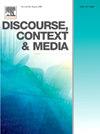Them! Ingroup-outgroup dynamics in Flemish anti-woke discourses on X
IF 3.1
2区 文学
Q1 COMMUNICATION
引用次数: 0
Abstract
Since the early 2020s, “woke” has emerged as a key term in culture war discourse in the U.S. and internationally. A key characteristic of this discourse is the sharp opposition between “us” and “them”, anti-woke actors presenting “the woke movement” as radically other. Drawing on international literature on social and media discourses about woke, this paper analyses the way #woke is used on X in Flanders, Dutch-language Belgium. While analyses of Belgian legacy media disclose balance in reporting on woke, this paper analyses X as a more anonymous setting with less content moderation and a tendency towards incivility. Using a combination of quantitative content analysis and qualitative thematic analysis, all Flemish tweets introducing #woke on X in 2023 are analysed (N = 449). The paper explores the overarching tone and dominant actors in these tweets, which actors tweet most negatively about woke, and how “us” and “them” are constructed in anti-woke discourse. The results show that most of the tweets (61.2 %) are negative, and that citizens are the most important actors (83.7 %). While politicians constitute a minority of the users tweeting #woke (11.4 %), right-wing politicians tweet most negatively about woke (97.2 %). The qualitative analysis of anti-woke tweets discloses a chain of equivalence creating a sharp opposition between “us” and “them”, whereby the former is mostly implicitly defined as the opposite of the latter. These tweets address an affective public, an imagined community defending “our freedom” (against cancel culture), “our nation” (against racial and religious others) and “ordinary people” (against elites).
他们!论X的佛兰德反觉醒话语中的群内群外动态
自20世纪20年代初以来,“觉醒”已经成为美国和国际文化战争话语中的一个关键术语。这种话语的一个关键特征是“我们”和“他们”之间的尖锐对立,反觉醒的行动者将“觉醒运动”呈现为激进的他者。本文借鉴国际上关于社会和媒体话语的文献,分析了在荷兰语比利时的佛兰德斯,#woke在X上的使用方式。虽然对比利时传统媒体的分析揭示了在报道觉醒时的平衡,但本文将X分析为一个更加匿名的设置,内容节制较少,倾向于不文明。采用定量内容分析和定性主题分析相结合的方法,对2023年所有介绍#woke on X的佛兰德语推文进行了分析(N = 449)。本文探讨了这些推文的总体基调和主导角色,哪些角色对觉醒的推文最负面,以及“我们”和“他们”是如何在反觉醒话语中构建的。结果显示,大多数推文(61.2%)是负面的,而公民是最重要的行动者(83.7%)。虽然政客在推特用户中占少数(11.4%),但右翼政客在推特上对觉醒的负面评价最多(97.2%)。对反觉醒推文的定性分析揭示了一条对等链,在“我们”和“他们”之间形成了尖锐的对立,前者大多被含蓄地定义为后者的对立面。这些推文针对的是一个有情感的公众,一个想象中的社区,捍卫“我们的自由”(反对取消文化)、“我们的国家”(反对种族和宗教其他人)和“普通人”(反对精英)。
本文章由计算机程序翻译,如有差异,请以英文原文为准。
求助全文
约1分钟内获得全文
求助全文

 求助内容:
求助内容: 应助结果提醒方式:
应助结果提醒方式:


